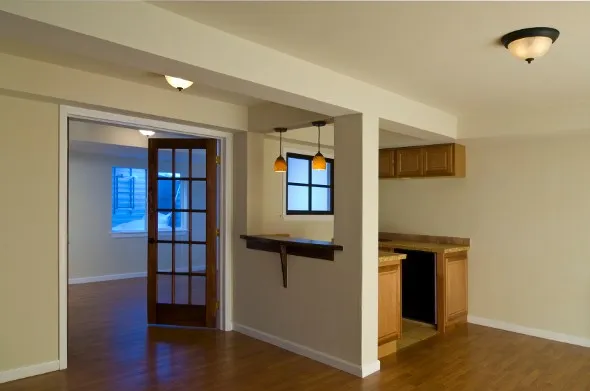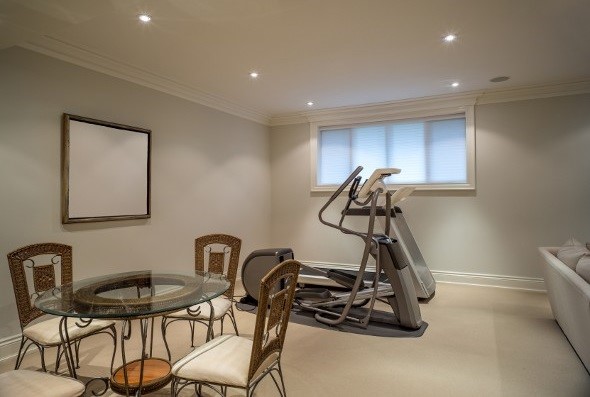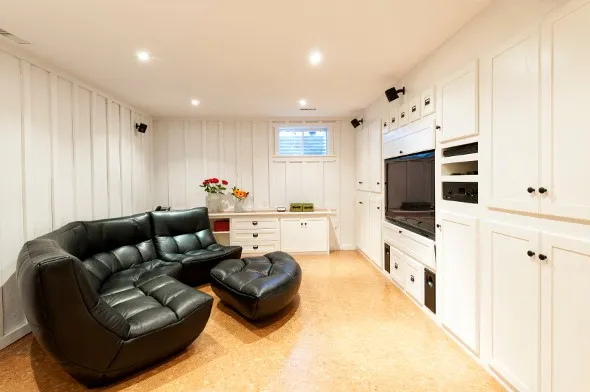Finishing your basement may be on your mind if you want to increase the value of your home or expand your family’s living space. The cost to finish your basement will depend on how elaborate you want the renovations to be. In general, though, there are a few rules that can help you estimate the cost and craft a budget for the project. Consider working with a financial advisor as you determine the cost of a finished basement and your resources.
Overview of the Average Costs to Finish a Basement
If you want to turn an unfinished space of concrete floors and exposed ductwork into a comfortable, livable space, expect to pay an average of $25 per square foot. Costs can range from $7 to $23 per square foot for basement finishing and the total will depend on the type and quality of materials, how the space will be used and the contractor’s labor rates if you’re not finishing it on your own. Labor averages between 10% and 25% of the overall project cost.
One study puts the range of total costs between $55,000 and $100,000, with an average cost of approximately $50,000, but another estimate puts the average at $18,395, with total costs ranging from $2,800 to $22,985. These can be good estimates for your budget but your local area and many other factors could impact what you’ll pay. It’s best to save as much as you can before starting the process because there is a good chance that unexpected expenses will come up.
Finishing a Basement vs. Remodeling vs. Renovation
Finishing a stubbed basement could be the most expensive option. You may require the help of a plumber ($45 to $100/hr), carpenter ($70/hr), electrician ($65 to $85/hr) and flooring installer ($5 to $10/sq.ft.) on top of the material and general contractor costs.
This may be the case if you’re remodeling as well, depending on how you’re changing up what is already finished. The costs of remodeling are going to depend on what you’re doing to the basement. Most remodels will typically gut the entire area and rebuild it with a different layout and finish. This could be the most expensive option because of the added costs to tear down what you already have finished.
A renovation is likely to be the most affordable way to improve your basement because it means your basement has already been finished but you’re updating the features or changing it up a bit. Any plumbing that is required has likely already been completed, the electricity is working and your basement already has the walls finished. These can be the most expensive parts of finishing a basement.
Factors that Determine the Cost to Finish a Basement

Size isn’t the only important factor that determines how much it will cost to finish your basement. One major component is the cost of labor. If you’re a skilled contractor or DIY pro you may be able to do everything yourself, but most of us can’t count on that cost-saving measure. Including labor, here are the most important costs to keep in mind that could drastically change what you’ll end up paying for your basement.
- Contractor Labor Costs: Labor costs vary widely from place to place. If you live in the Tri-State area, for example, you’ll likely pay more than you would in, say, Nebraska. Another consideration is the reason for the project. If it is to boost resale value make sure you are only doing those things that are likely to boost the value of your property.
- Additional Labor Costs: You’ll need plumbing to set up the bathroom (and the kitchen if you install one). You’ll need installation work for cabinets. You’ll need an electrician to wire for the lighting. And you’ll need someone to help you with the flooring and drywall. If you don’t want to paint your own walls, you’ll need painters.
- Materials: The more you want to do to your basement, the more materials you’ll need. This could include the basic cabinets, drywall, flooring and paint but it could also include extras that you want to make your space look and feel the way you want.
- Layout: Also important to the cost calculation is what you have in mind when you think of “finished basement.” Assuming you want a bathroom, do you want a full bath or a half bath? Do you want a full kitchen? A basic set of furniture or a pool table, exercise machine and wet bar? Will you stick with concrete floors or add carpeting or hardwood? Your answers to these questions will help determine the cost of finishing your basement.
- Local Building Laws: Another feature that can add to the cost is compliance with local building codes. If you’re turning your basement into a sleeping space, you’ll need to have an emergency exit separate from the staircase that connects the basement to the main part of the house. This can be a door or what’s known as an egress window. It’s important to comply with local codes when it comes to the dimensions of your egress window.
How to Cut Costs

Undertaking a more modest project will help you save money, especially important if you struggle to make your monthly mortgage payments. If you decide you don’t need a kitchen and can make do with a half bath, you’ll save a bundle. There are other ways to cut costs, too. You can paint the walls yourself or with the help of friends and family (be sure to provide some pizza!).
You can also choose more modest materials and furnishings. Of course, you don’t want to skimp on the materials that are important for, say, insulating the basement or keeping water from leaking into the flooring. But you can choose more modest hardware, curtains and furnishing if you’re trying to keep to a tight budget.
As with any home renovation, it’s a good idea to get quotes from a few service providers before you commit. That way, you can compare prices and maybe even negotiate a better deal.
Bottom Line
Finishing your basement provides an estimated 73% return on investment when it comes time to sell your home (although that might vary). If you live in an area that’s prone to flooding, you may decide that finishing your basement is too much of a risk. Or, if the home in question is an investment property you may decide that finishing the basement isn’t worth the cost.
Tips for Homeowners
- If you decide to go forward with a basement renovation project, it may be helpful to consult a financial advisor to figure out how the investment will affect your overall budget and financial plan. Finding a qualified financial advisor doesn’t have to be hard. SmartAsset’s free tool matches you with up to three financial advisors who serve your area, and you can interview your advisor matches at no cost to decide which one is right for you. If you’re ready to find an advisor who can help you achieve your financial goals, get started now.
- Estimate your monthly mortgage payment with taxes, fees and insurance with our free mortgage calculator.
- Use SmartAsset’s mortgage comparison tool to compare mortgage rates from top lenders and find the one that best suits your needs.
Photo credit: ©iStock.com/Elenathewise, ©iStock.com/seanfboggs, ©iStock.com/FOTOGRAFIA INC.
